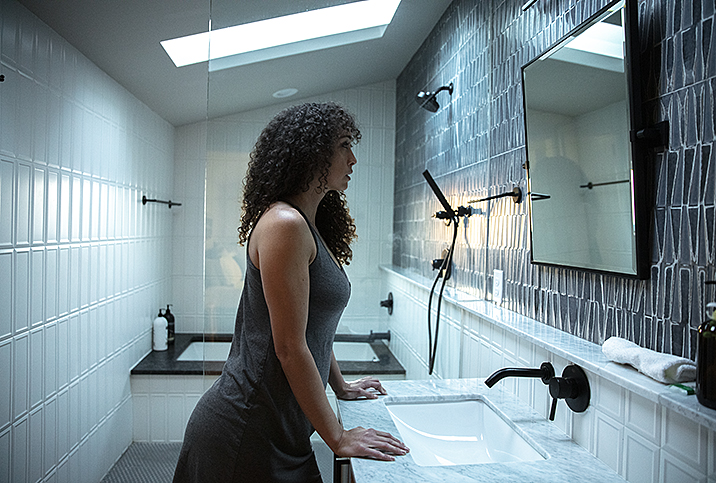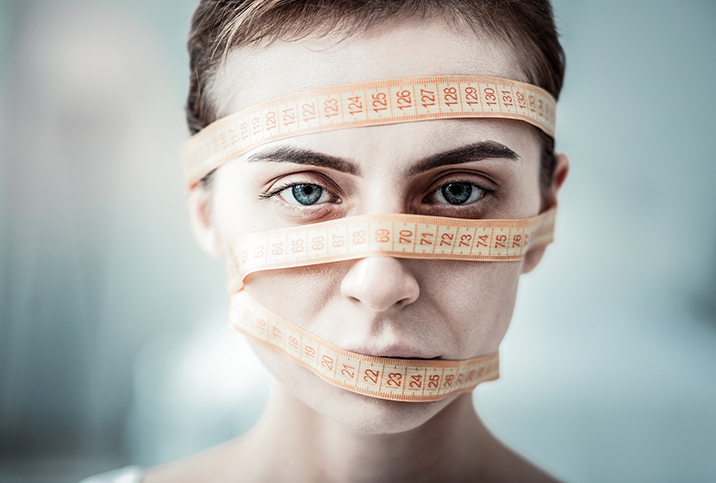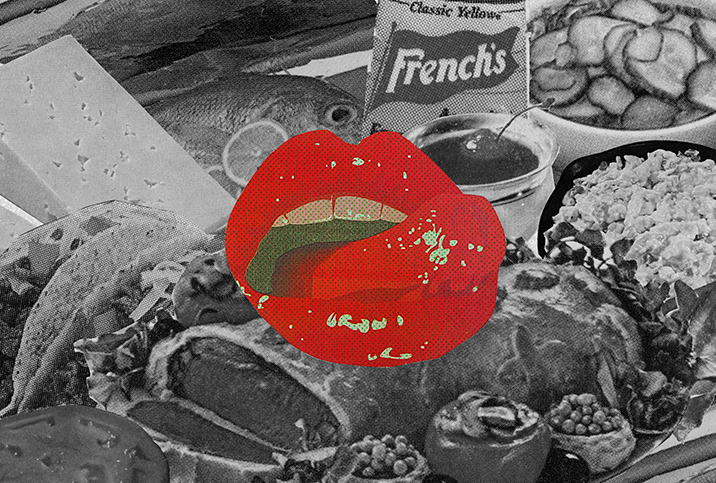Is Body Dysmorphic Disorder Ruining Your Sexual Well-Being?

It's not you. It's your phone—and phones and cameras and mirrors everywhere, convincing you you're too fat, too thin, your nose is too big, your eyes are too small. You're not tall enough, you need more muscle tone. Hold your stomach in! Get your lips plumped! Whiten your teeth! Just when you make peace with your facial features, it starts picking on your hair. It's relentless, impossible to please and it could be ruining your sex life.
Body dysmorphic disorder (BDD) is a preoccupation with what you perceive to be the defects in your appearance. Risk factors include experiences of teasing or abuse as a child, suffering from anxiety or depression, being a perfectionist and having family members with BDD or obsessive-compulsive disorder (OCD). Though common in both women and men, BDD affects women slightly more.
The social media effect
Women have long been subjected to unrealistic beauty standards that can expose insecurities in even the most confident and well-adjusted among us. Historically, women's magazines were the arbiters of these beauty standards, and many of us grew up comparing ourselves to Kate Moss, Naomi Campbell, Liu Wen, Tyra Banks and other supermodels whose perfection was both God-given and heavily enhanced by makeup artists, lighting and airbrushing.
Over time, and perhaps due to public outcry, magazines and brands have made a point of citing the body diversity of their models and their anti-airbrushing stance. But we can't escape: Social media is now, for many, the driving force behind BDD. Name-calling, body-shaming and savage comments on posts can lead to lower self-esteem, which increases the risk of the disorder happening to you.
Even when we're admired for our attractiveness online, it's still not enough. We scrutinize our photos and become our own worst critics. According to a poll by the American Academy of Facial Plastic and Reconstructive Surgeons, more than 40 percent of plastic surgeons say looking better in selfies and videos on Instagram, Snapchat, TikTok and Facebook drives patients of all ages to undergo both cosmetic surgery and nonsurgical enhancements, such as Botox and fillers. Staring at ourselves in Zoom meetings isn't helping this tendency to obsess over our appearance, either.
Along with the poll, the Journal of the American Medical Association (JAMA) Facial Plastic Surgery published results from a study revealing the many ways in which our bodies are in fact distorted in most of the pictures we're seeing of ourselves, and particularly in selfies. Researchers measured distance and angle from the camera lens and found that slight variations can make a big difference in the size of our features in the resulting photos, both good and bad. Unfortunately, the bad is what we most often see in ourselves, while the good is what we see in others.
Symptoms of body dysmorphic disorder
While BDD affects people of all ages, symptoms usually begin in adolescence and young adulthood and include a variety of habits born out of shame over our personal appearance, such as:
- Constantly checking yourself in the mirror.
- A pervasive feeling that you are ugly.
- Hiding body parts you don't like under clothing, hats or scarves.
- Constantly comparing yourself to others.
- Frequently seeking reassurance from others about your attractiveness.
- Obsessing about cosmetic procedures and treatments.
- Avoiding social gatherings because you feel insecure about your looks.
- Repeatedly measuring or touching your perceived defect.
- Experiencing problems at work or school, or in relationships, due to the inability to stop focusing on your perceived defect.
- Repeatedly consulting with medical specialists, such as plastic surgeons or dermatologists, to find ways to improve your appearance.
Effects on sexuality
If you suffer from BDD, you may also find you're avoiding sex or have low libido. At the same time, any lack of physical intimacy may make you feel as if there is something wrong with you. You might believe only beautiful people are worthy of love and think you'll finally "deserve" a partner once you lose weight or achieve some other beauty goal. This can lead to unhealthy celibacy that keeps you from enjoying healthy physical connection and pleasure.
Conversely, you might swing to the other extreme and crave validation of your attractiveness by seeking out a variety of sexual partners. BDD often increases the risk of impulsive sexual behavior.
You might be unfaithful to your partner and risk losing relationships over infidelity. Or you may choose to pursue a series of casual sex partners, though you'd prefer to have a committed relationship. You may fear you're not "good" enough for a committed partnership. This fear could be lurking in your subconscious, and you may not even realize your behavior is self-defeating.
When you're in a committed relationship, BDD can spark insecurity in bed. You might not want your lover to see your body and insist on keeping the lights off during lovemaking or avoid certain intimate activities, such as showering together. You might become suspicious of perceived romantic rivals or fear your partner will meet someone more attractive and abandon you.
Healing
Although there is no standardized treatment for BDD, talking with a psychotherapist might be helpful. Consider getting off social media or at least taking a break from scrolling through the carefully curated lives of people who use retouching, filters and other tools and apps to make themselves appear the way they want to be seen.
Focus on developing healthy self-esteem and valuing yourself for who you are, rather than how you look. Put a moratorium on self-improvement projects and, instead, search the mirror for things you like about yourself. Write a gratitude list to your face and body every morning. If you look for your beauty, both within yourself and in the mirror, you will find it.

















